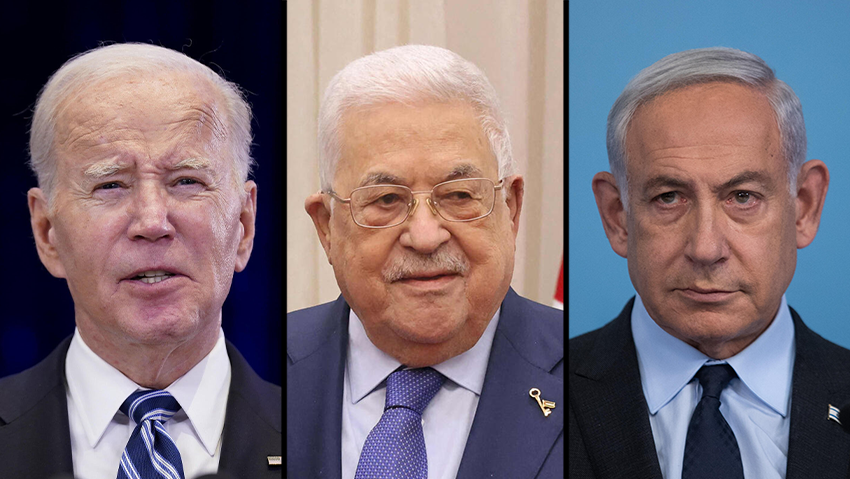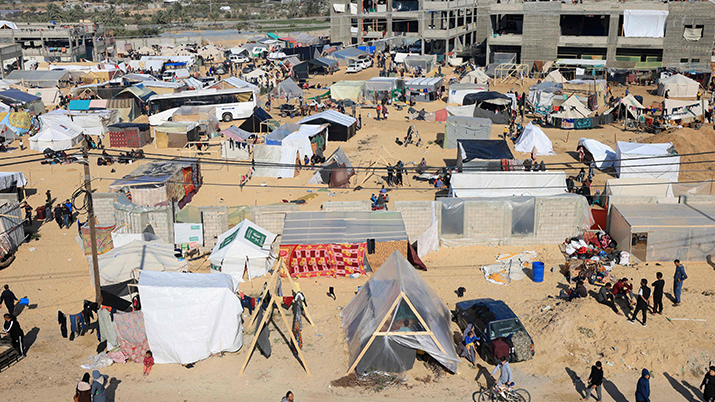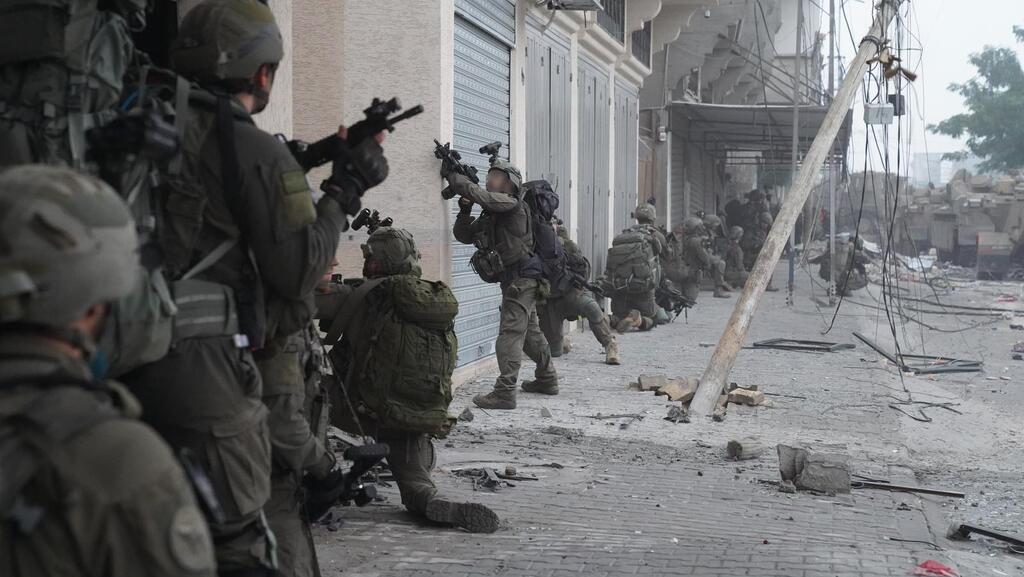Getting your Trinity Audio player ready...
Senior U.S. officials said Israel has no interest in discussing the "day after the war" because it does not want to send a message that the fighting are nearing their end, however in Jerusalem, there is an understanding that the matter must be discussed although it has little political viability.
More stories:
Arabs nations would have to be involved and they are concerned that Israel would not be prepared to discuss the broader plan. Israel said there would be no Palestinian Authority involvement in the rehabilitation of Gaza and that Arab nations were willing to be involved, but they seek assurances that a broad initiative would be discussed.
3 View gallery


Joe Biden, Mahmoud Abbas, Benjamin Netanyahu
(Photo: AFP, Evan Vucci /AP, Alex Kolomoisky )
The American officials said the U.S. position was that the PA must be somehow involved in post war Gaza, but no one could say what that involvement would look like. Palestinian President Mahmoud Abbas would not be the one to run Gaza, but the PA's involvement is critical for the support of Arabs. The Biden administration describes a "revitalized Palestinian Authority," which would be stronger and different than the current PA.
Israel made its position clear to the U.S. that the PA which pays stipends to terrorists, incites violence and does not condemn terror, cannot be a partner that would control Gaza. "There is an understanding that a local Palestinian leadership is needed at the end of the day, after an interim period but th Americans are realizing that the PA in its current make-up is problematic," A senior official said.
Netanyahu told Sky News in Arabic on Wednesday that as long as he is prime minister, Abbas would not be given control of Gaza and the West Bank.
According to the officials, the White House wants Israel to end its aerial bombardments in Gaza and at least for now, reduce them significantly but there is an understanding in Washington that defeating Hamas would take time, just as defeating ISIS took the U.S. time to achieve.
3 View gallery


Tents set up to house displaced Palestinians in the south of Gaza
(Photo: Mahmud Hams / AFP)
"Israel cannot continue attack at the current pace," on officials said. "Ahead of the Christmas celebrations and the start of the new year, the U.S. will be focused on this. I don't know if there will be disagreement between Washington and Jerusalem, but the problem is that Prime Minister Benjamin Netanyahu, wants to prolong attacks as much as possible and has no interest in ending the war because he knows what will be coming," he said.
The U.S. wants to see the ground offensive over during January 2024. According to observers in Jerusalem that deadline is due to U.S. President Joe Biden's reelection campaign ahead of the November ballot.
The administration has made clear that it stands by Israel and defends it in the international arena but that it is coming under increasing internal political pressure. According to an Israeli official, the longer the war in Gaza continues, the less chance there would be to reach a regional solution before the end of the first Biden term and the hopes for a Saudi-Israeli deal would not be considered until the war ends.
Before the Hamas attack on October 7, the U.S. hoped to bring a historic peace agreement between Saudi Arabia and Israel, by the spring of 2024, that would be Biden's primary foreign policy achievement before the elections. But the events of that day and the ensuing war, had changed those plans.
Washington still believes, however that a normalization deal is possible in the course of the next year, but only after the war in Gaza ends and there is a period of calm. An Israeli official who spoke to the Americans said the hope in Jerusalem was to reach such a deal by the end of 2023. He noted that the Abraham Accords were also signed in the final months of the Trump administration.
The Israeli official said the working assumption is that Saudi Arabia still prefers to reach a deal with a democratic administration in power, because such a deal would be most likely to win congressional support if the democrats hold the White House, and no one can be sure what the outcome of the November presidential elections would be.
"There is an understanding in Washington that Hamas must be eliminated, and the hostages returned," the Israeli official said. "If there is a way to bring Hamas to its knees within weeks, its leadership killed and the hostages freed, Israel would have no interest in prolonging the war indefinitely," he said.
"As long as we have the U.S., we have backing in the UN Security Council. We see eye to eye with the West on the need to take down Hamas and free our hostages. The timeline is dictated by the reality on the ground."
The Americans are seriously considering the day after the war and have sent a delegation headed by Dr. Philip Gordon, National Security Advisor to Vice President Kamala Harris who met with Israeli officials including National Security Council Tsachi Hanegbi, Strategic Affairs Minister Ron Dermer and members of the war cabinet Benny Ganz and Gadi Eizenkot. They also met with Opposition Leader Yair Lapid but were refused a meeting with Defense Minister Yoav Gallant.
The White House said Gordon discussed efforts to rehabilitate Gaza after the fighting and that he made clear that the Palestinians must see a credible political solution for the future.
On Wednesday, State Department Spokesperson Matthew Miller said the White House supports Israeli troops remaining in Gaza on a temporary basis after the fighting and that leaving would only endanger Palestinians and would not be helpful for a transformation process. He would not say how long the forces would stay but said the administration made it clear to Israel that Gaza could not be occupied again.


